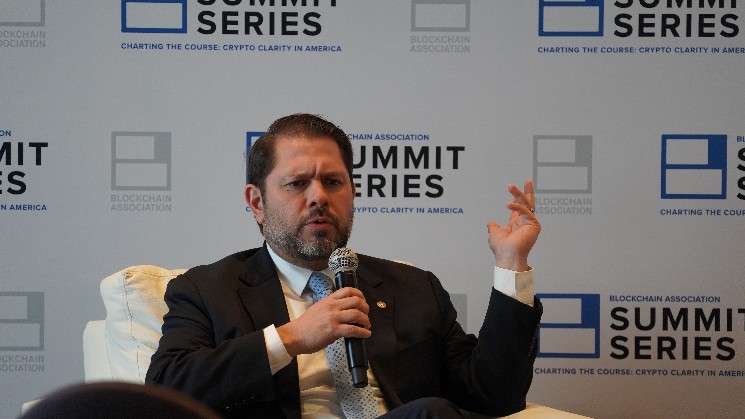The Senate’s stablecoin bill, known as the “Guiding and Establishing National Innovation for U.S. Stablecoins of 2025” (GENIUS) Act, has seen a shift in support from Democrats, with Arizona Senator Ruben Gallego predicting that as many as 16 Democrats may vote in favor of the bill in its final set of votes.
Last month, Gallego led a group of Democrats against voting for cloture, citing concerns about consumer protection and other provisions. However, after negotiations and amendments, he and his colleagues have now flipped their stance and are expected to continue advancing the bill in the Senate.
Gallego emphasized the importance of bringing a “good product” to the floor, and he has worked tirelessly to negotiate the language of the bill with other lawmakers. While there were initial challenges and disagreements, he believes that the bill has been significantly improved through bipartisan cooperation.
The bill’s success is crucial for setting up regulations for the wider crypto markets, and Gallego hopes that market structure legislation will also be addressed in a bipartisan manner. He stressed the importance of both bills passing Congress and being signed into law to provide clarity for traditional finance firms and the general public looking to engage with digital assets.
Congressman French Hill echoed Gallego’s sentiments, highlighting the need for both bills to be passed to avoid regulatory uncertainty. Without clear regulations, traditional finance institutions may hesitate to participate in the digital assets sector, hindering its growth and interoperability.
While there is optimism for a August deadline, some lawmakers believe that early next year may be a more realistic timeline for passing both bills. Cooperation between parties and chambers will be essential to move the legislation forward and avoid delays.
In order to amplify their impact in Washington, Blockchain Association CEO Summer Mersinger emphasized the importance of the crypto industry speaking with “one strong, loud voice.” While there may be differences in opinions and approaches, finding common ground and presenting a unified front to lawmakers will be key in advocating for the industry’s interests.
As the House Financial Services Committee prepares to markup the market structure bill, lawmakers are focused on ensuring that both bills align and are passed swiftly to provide clarity and regulatory framework for the digital assets sector. With continued cooperation and bipartisan support, the Senate’s stablecoin bill and market structure legislation have the potential to shape the future of the crypto industry in the United States. The COVID-19 pandemic has changed the way we live, work, and interact with one another. As we continue to navigate through these challenging times, it has become more important than ever to prioritize our mental health and well-being.
One of the most significant impacts of the pandemic has been the increase in stress, anxiety, and depression among individuals. The uncertainty surrounding the virus, the constant changes in restrictions and guidelines, and the isolation caused by social distancing measures have taken a toll on people’s mental health.
It is crucial to recognize the signs of mental health issues and seek help when needed. Some common symptoms to look out for include feeling overwhelmed, constant worry, changes in sleep patterns, loss of interest in activities, and difficulty concentrating. If you or someone you know is experiencing these symptoms, it is important to reach out to a mental health professional for support.
There are several ways to prioritize your mental health during these challenging times. One of the most important things you can do is to take care of your physical health. This includes eating a balanced diet, getting regular exercise, and getting enough sleep. Physical activity has been shown to have a positive impact on mental health, so finding ways to stay active, even if it’s just a short walk outside, can be beneficial.
It is also important to stay connected with others, even if it’s through virtual means. Social support is crucial for maintaining good mental health, so be sure to reach out to friends and family members regularly. If you are feeling isolated, consider joining online support groups or seeking out virtual therapy sessions.
Practicing self-care is another important way to prioritize your mental health. This can include activities such as meditation, yoga, journaling, or engaging in hobbies that bring you joy. Taking time for yourself and doing things that make you happy can help reduce stress and improve your overall well-being.
Finally, it is important to stay informed but limit your exposure to news and social media. Consuming too much information about the pandemic can increase feelings of anxiety and overwhelm. Be sure to take breaks from the news and focus on activities that bring you peace and relaxation.
In conclusion, prioritizing your mental health during the COVID-19 pandemic is essential for maintaining overall well-being. By taking care of your physical health, staying connected with others, practicing self-care, and limiting exposure to negative news, you can help protect your mental health during these challenging times. Remember, it’s okay to ask for help when needed, and reaching out to a mental health professional can provide you with the support you need to navigate through these difficult times.

